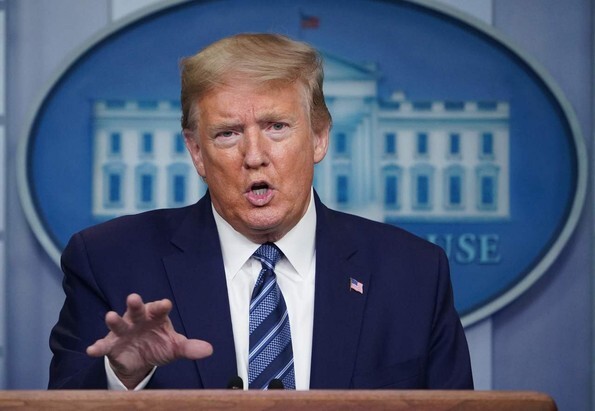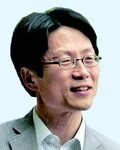hankyoreh
Links to other country sites 다른 나라 사이트 링크
[Column] Trump says S. Korea needs to pay more for its defense; it already has

Why has defense cost-sharing become an issue between South Korea and the US? At first glance, there wouldn’t seem to be a problem. The US sends its military to contribute to the defense of South Korea, and South Korea bears a share of the costs. No matter how you look at it, it’s difficult to argue against South Korea bearing a proportionally larger responsibility now that it has grown economically and enjoys a higher global stature. Is Donald Trump correct in what he has been saying?
He isn’t. In 2015 alone, South Korea spent some 5.4 trillion won (US$4.49 billion) on its share of defense costs. It bore over 90% of the 11 trillion won (US$9.14 billion) in total costs for the US to relocate its Yongsang Garrison to Pyeongtaek, Gyeonggi Province. After an amendment to the original Land Partnership Plan (LPP) between the two sides, South Korea ended up paying most of the costs for the relocation of the US 2nd Infantry Division, which the US was originally supposed to cover. This means that South Korea is not only paying quite a lot of costs each year, but it also covered something that the US was supposed to pay for according to the two sides’ agreement. South Korea is already providing more than its share.
Trump’s demands exceed what’s stipulated in SMAThe problem lies in the fact that the “defense cost-sharing” arrangement that South Korean and US authorities are negotiating right now is different from the sharing of costs in a broader sense. This form of defense cost-sharing refers to support provided to US Forces Korea (USFK) in accordance with the Special Measures Agreement (SMA) according to Article V of the “Agreement under Article IV of the Mutual Defense Treaty between the Republic of Korea and the United States of America, regarding Facilities and Areas and the Status of United States Armed Forces in the Republic of Korea.” The share of defense costs contributed under this agreement is to be used to partially cover stationing costs for USFK. What the Trump administration is currently demanding is South Korea’s payment of support beyond what it is stipulated there. Those demands are the problem.
The matter that has been receiving the most immediate attention is the absurdly large amount that the US is asking for. Initially, the Trump administration demanded a contribution of 6 trillion won (US$4.98 billion), which would exceed the total of all direct and indirect support costs from South Korea. The US reportedly “reduced” that amount to US$1.3 billion in recent negotiations -- but it is still asking for a nearly 50% increase from what South Korea paid in 2019.
In point of fact, South Korea’s share of defense costs has been snowballing ever since the SMA was first signed in 1991. Starting at 107.3 billion won (US$89.1 million) in its first year, it has increased annually to reach 1.04 trillion won (US$863.4 million) as of last year -- a nearly tenfold increase. In the meantime, the number of USFK troops has continued to decline, falling from nearly 43,000 in 1991 to 28,000 currently. What accounts for this bizarre phenomenon, where our share of defense costs increases even as troop numbers drop?
One answer lies in the context of the SMA’s signing. At the time it was concluded in 1991, the importance of this agreement was overshadowed by the simultaneous announcement of a first amendment to the Status of Forces Agreement (SOFA). Societal attention back then was focused on the amendment of provisions with unequal terms, including the automatic forfeiting of South Korean criminal trial authority for US troops. The Roh Tae-woo administration’s reason for signing the agreement lay in the fact that the Cold War regime had started to collapse in 1989.
Amid strong calls for troop cutbacks within the US, a three-stage USFK restructuring plan was created, according to which 7,000 troops would be withdrawn in the first stage through 1991, with only a minimum left behind after the third stage in 1996-2000. For a conservative administration that saw USFK as a sine qua non, this was galvanizing news. So taken aback were they that they started freeing up funds in the name of “defense cost-sharing” in a last-ditch effort to avert the withdrawal of US troops.
SMA violates terms of SOFAA clear indication of how urgently the Roh administration perceived the situation at the time can be found in the fact that the SMA is itself in violation of its parent agreement, the “Agreement under Article IV.” Article V of SOFA states that the US will “bear for the duration of this Agreement without cost to the Republic of Korea all expenditures incident to the maintenance of the United States armed forces in the Republic of Korea.”
Yet the SMA violates these terms, assigning South Korea to pay the necessary costs for the maintenance of USFK. The fact that the SMA, which is in severe violation of the National Assembly-ratified SOFA, was not itself ratified by the National Assembly is another major procedural issue.
The issue with the current negotiations on the sharing of defense costs is the attempt to violate the SMA -- which is already in violation of SOFA -- to force South Korea to pay costs above and beyond those associated with maintaining USFK. It has already emerged that the US military used 13.4 billion won (US$11.1 million) from South Korea’s share of defense costs last year for purposes such as servicing US Forces Japan fighter aircraft and search-and-rescue helicopters. After previously disregarding the SMA to apply our share of defense costs to purposes other than USFK maintenance, they are now seeking to justify that by introducing a new item altogether.
The price tag isn’t the only issue with defense cost-sharing. Longstanding bad practices need to be rectified.

By Seo Jae-jung, professor of international relations and political science at the International Christian University in Japan
Please direct comments or questions to [english@hani.co.kr]

Editorial・opinion
![[Column] Season 2 of special prosecutor probe may be coming to Korea soon [Column] Season 2 of special prosecutor probe may be coming to Korea soon](https://flexible.img.hani.co.kr/flexible/normal/500/300/imgdb/original/2024/0426/3317141030699447.jpg) [Column] Season 2 of special prosecutor probe may be coming to Korea soon
[Column] Season 2 of special prosecutor probe may be coming to Korea soon![[Column] Park Geun-hye déjà vu in Yoon Suk-yeol [Column] Park Geun-hye déjà vu in Yoon Suk-yeol](https://flexible.img.hani.co.kr/flexible/normal/500/300/imgdb/original/2024/0424/651713945113788.jpg) [Column] Park Geun-hye déjà vu in Yoon Suk-yeol
[Column] Park Geun-hye déjà vu in Yoon Suk-yeol- [Editorial] New weight of N. Korea’s nuclear threats makes dialogue all the more urgent
- [Guest essay] The real reason Korea’s new right wants to dub Rhee a founding father
- [Column] ‘Choson’: Is it time we start referring to N. Korea in its own terms?
- [Editorial] Japan’s rewriting of history with Korea has gone too far
- [Column] The president’s questionable capacity for dialogue
- [Column] Are chaebol firms just pizza pies for families to divvy up as they please?
- [Column] Has Korea, too, crossed the Rubicon on China?
- [Correspondent’s column] In Japan’s alliance with US, echoes of its past alliances with UK
Most viewed articles
- 1[Column] Season 2 of special prosecutor probe may be coming to Korea soon
- 2‘We must say no’: Seoul defense chief on Korean, USFK involvement in hypothetical Taiwan crisis
- 3No good, very bad game for Korea puts it out of Olympics for first time since 1988
- 4Division commander ordered troops to enter raging flood waters before Marine died, survivor says
- 5Is Japan about to snatch control of Line messenger from Korea’s Naver?
- 6Korea’s 1.3% growth in Q1 signals ‘textbook’ return to growth, says government
- 7Is N. Korea threatening to test nukes in response to possible new US-led sanctions body?
- 8[Editorial] Korea’s surprise Q1 growth requires objective assessment, not blind fanfare
- 9[Editorial] New weight of N. Korea’s nuclear threats makes dialogue all the more urgent
- 10‘Weddingflation’ breaks the bank for Korean couples-to-be